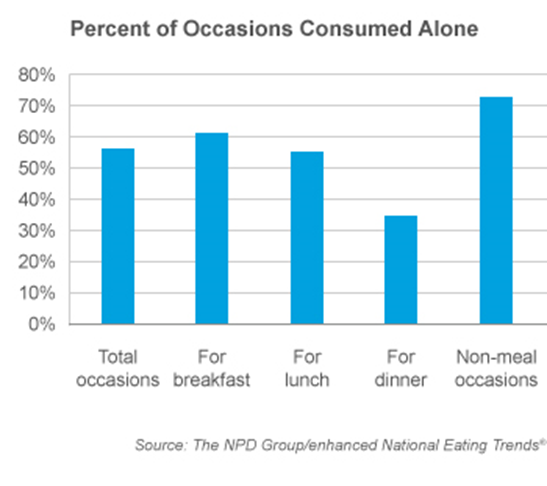CHART OF THE DAY: Read this while you're eating lunch by yourself
Chances are if you are catching up on blogs on your lunch break today, you are probably at your desk, alone, while you read and munch on that tuna sandwich.
Today's Chart of the Day comes courtesy of the retail and consumer goods research and advisory firm NPD Group that took a look at American's eating habits - specifically examining just how often people are eating alone. Turns out, you are not alone in eating alone. Take a look at the data and then some FREE commentary from me after the chart:

A quick read of the data shows that we are eating alone about 60% of the time for breakfast and that about 55% of lunches are solitary occasions. We recover, and get more social for dinner however, with only about a third of evening meals take solo.
What might this mean for you the HR/Talent pro? As usual, who really knows, but let's take a shot anyway.
1. People will be more productive, (and probably happier), on the whole if they can take a complete break, even for 15-20 minutes from their work and the cognitive processing that accompanies said work. If someone never takes a break during the day time, then by about 2 or 3 in the afternoon they are likely to hit the wall, looking to some kind of artificial short-term remedy (like an energy shot which are disgusting or a candy bar, which are not disgusting but you probably don't need one), to try and make it until quitting time. If you in HR/Talent are really interested in helping people achieve the most they can at work, you are going to care if/when your entire organization seems to slow to a crawl at 3:30 every day.
2. Most people eat breakfast on the run and lunch by themselves at their desks because they have this sense of 'I can't take a real break, I just have too much to do', even if that is not really true. But we have gotten conditioned to see fully disconnecting from work as some kind of admission of slacking off, or of lack of dedication. We also think 'busy' equates to 'important' and while sometimes that is true, I bet the really important people at work probably are taking more social and casual lunches than most. HR pros should be mindful or at least aware of any ill-effects of burnout one symptom of which is an army of cube-dwellers eating/working through lunch day after day.
3. If you need to 'catch' people that usually prove difficult to pin down, (Note: I am one of these kind of people), then you might want to attempt to hit them up at lunch time. Sure, there is some risk in interrupting someone's 'downtime' at lunch, but chances are they are not really taking a break anyway, they are by themselves still glued to their computer, and you won't be competing with anyone else for their time.
What's your take? How often are you eating lunch alone at your desk? See any problem with that?
Have a great week!

 Steve
Steve



